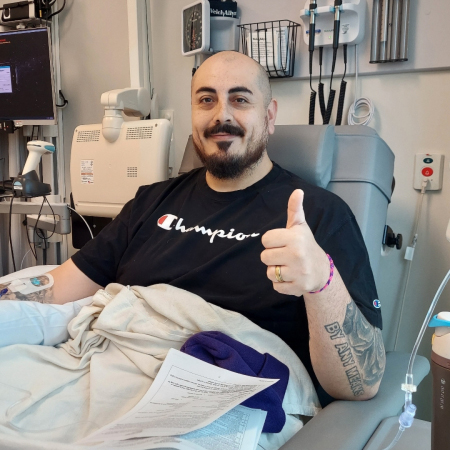Genetic Testing
Back to Diagnostic Tests & Scans
Table of Contents
Should you get genetic testing?
The only way to know if you have hereditary colorectal cancer, or if genetics played a role in your diagnosis, is through genetic testing.
Anyone who meets the following criteria is a candidate for genetic testing.
- Diagnosed with colon cancer or rectal cancer under age 50
- Diagnosed with endometrial cancer under age 50
- Multiple primary cancers or bilateral cancer (occurs in both paired organs—e.g., both breasts, kidneys, ovaries)
- 3+ family members with a related cancer of Lynch syndrome
- 2+ Lynch syndrome-associated cancers in a single family member
- Has abnormal IHC for mismatch repair proteins in a tumor
- Tumor that shows MSI
- Family member has an identified gene mutation
- 10+ colon polyps removed over the course of their lifetime, or a family member has had 10+ polyps
Who orders the tests?
Genetic testing can be ordered by a doctor, genetic counselor, nurse, physician assistant, or another provider. However, some insurers will only cover genetic testing if it is ordered by a board-certified geneticist or genetic counselor, therefore you may want to check with your insurance policy.
Additionally, you can order testing online from certain websites. If you choose to go this route, it’s critical to follow up with a genetic counselor or another health care provider to make sure results are clearly understood and the correct follow-up and screening care are recommended. It is also important to understand that not all genetic tests are created equally. It is important to check with a provider to ensure any genetic test you order online is accurate and comprehensive.
What kind of sample is needed for genetic testing?
For hereditary cancer testing, a nurse at the genetics office will typically collect blood or saliva.
What’s the difference between germline and somatic testing?
Germline testing (genetic alterations)
Germline mutations are the gene mutations you were born with, and therefore are found in every cell of your body. They are typically (although not always) inherited from a parent and can be passed on to your children.
There are 3 types of germline tests:
| Single site | Looks at a specific mutation in a specific gene. If you already have a family member with a known mutation, you may receive this test since genetic counselors know what gene mutation to look for. |
| Single gene | Looks at many locations along one or a few specific genes to find a mutation. This type of test is done when clinical features (type and number of polyps) suggest a certain gene might hold the mutation. |
| Multi-panel gene | Used to evaluate many genes in a single test. This type of test is done when clinical features (type and number of polyps) could be consistent with multiple different hereditary cancer syndromes. |
Somatic testing (genomic alterations)
Somatic mutations arise spontaneously in a person’s body during their lifetime. They are acquired over time and therefore, they are not passed down in a family.
Somatic testing (also referred to as biomarker testing or tumor testing) is done on tumors to see what gene mutations have accumulated in cancer cells. It is often used to make treatment decisions – to find better therapies targeting specific gene mutations found in cancer cells.
Germline testing and somatic testing are not interchangeable and are performed for different reasons. If you are confused about the testing you have undergone be sure to have a discussion with your health care team to discuss which tests you have had.
When is the right time for testing?
This is different for everyone. Physicians often discuss genetic testing at the time of cancer diagnosis, as it may guide treatment decisions. However, some patients may be so overwhelmed at this time (processing new and complicated information) that genetic testing may be pursued later.
Also, because research is moving rapidly in this field, many doctors may recommend patients receive genetic testing years after their cancer treatment ends. Many individuals who have not had cancer would like to pursue genetic testing to see if they have inherited a genetic mutation. Testing for cancer genes is generally not performed until after age 18 (except some polyposis conditions, such as FAP).
Who should get tested first?
Looking for a gene mutation is like looking through a book for a misspelled word. For the best chances of discovering if a mutation runs in your family, it’s best to test a family member who has already had cancer or multiple colon polyps first. They are the most likely person in your family to have a genetic mutation.
In this case, the testing looks through many genes to find a mutation that may be associated with a hereditary cancer predisposition. Once a mutation is identified in a family, testing for other family members is targeted, looking only at the specific genetic change in the family.
Who pays for genetic testing?
Many insurance companies realize the importance and value of testing and provide coverage for individuals who meet certain criteria. Your genetic counselor will discuss this with you to determine if testing is a covered benefit.
For individuals who do not qualify or choose to pay out of pocket, costs are often less than $300.
What about discrimination?
State and federal laws are in place to protect your genetic information from being used against you. The Genetic Information Nondiscrimination Act (GINA) was put into law to avoid employer discrimination against people with genetic predispositions to disease. Because of GINA, it is unlawful for employers with more than 15 employees to discriminate based on genetic information. The law also keeps health insurers from dropping, refusing to cover, or charging higher premiums for those with positive genetic test results.
For more information: www.ginahelp.org.
Explore these resources to locate a genetic counselor or a GI Cancer Genetics Clinic.
What is Lynch Syndrome?
Lynch syndrome is the most common form of hereditary colorectal cancer affecting more than 1.2 million people. To put it in perspective, this is about the population of New Hampshire.
Genetic Test Results
Genetic testing is not perfect, and we have not yet discovered all of the genes linked to hereditary CRC. Your genetic counselor will tell you what your results mean for your specific case, and you will work with them and your doctors to decide on screening recommendations. Here is a brief overview of some results you may encounter.
Positive
A positive test result means you have a known, pathogenic (or disease-causing), genetic mutation. This can affect which treatment your doctor recommends if you have a cancer or develop cancer in the future. It may also help guide specific cancer screening recommendations for you.
If you or a family member test positive for a gene mutation, it may affect your blood relatives. Most hereditary cancers are inherited in a dominant pattern, meaning that first-degree relatives (parents, siblings, children) of someone with a mutation have a 50% chance of carrying the mutation and may want to get tested.
Work with your genetic counselor to create a plan for telling family members about genetic testing, and suggest they talk with their doctors to see if it is right for them.
Variant of Uncertain Significance / Variant of Unknown Significance (VUS)
A VUS result means there’s an identified change (variation) in the gene that is different than the normal gene, but it’s unknown if it leads to an increased risk for cancer. Up to one third of people who receive multi-gene panel genetic testing get a VUS.
Many variants are likely of no concern and represent normal, unique changes in our genetic code. A VUS does not change clinical management unless proven pathogenic. If researchers later discover that a VUS you have is, in fact, related to cancer risk, it would then be reclassified as a positive/clinically significant inherited gene mutation, and you would be contacted by your genetic counselor with your updated result. At that point, your preventive screening schedule and/ or treatment plan would change to reflect the new diagnosis.
Most labs will contact the clinician who ordered your test if new research shows that a VUS is shown to be cancer-causing. *This is why it’s important to let your genetic counselor know if you move, change phone numbers, or update your email address.
Negative / No Known Mutation
Many people test negative for genetic mutations related to hereditary CRC. While this may mean that the cancer is familial or sporadic, the possibility that the cancer is linked to a gene mutation that was not tested for (or has not yet been discovered) cannot be excluded.
When genetic testing is negative, screening and surveillance guidelines are based on your specific personal and family history and will fall within the recommendations provided by the American Society of Clinical Oncology (ASCO) and the National Comprehensive Cancer Network.
If there is a known genetic mutation in your family and you test negative for that specific genetic change, this is considered a “true negative” result. At that point, your cancer risk would likely be that of the general population, also known as “average risk” and you would follow standard screening guidelines.
Why work with a genetic counselor?
Ideally, your doctor will refer you to a genetic counselor if there is a suspicion that you carry an inherited cancer mutation. But sometimes, you may need to advocate for yourself. Genetic counseling is an educational process in which your genetic counselor will explain in detail how families inherit cancer and how cancer grows.
A genetic counselor will:
- Review and discuss your medical and family history
- Discuss the likelihood that the cancer in your family could be due to an inherited gene mutation
- Explore options for genetic testing
- Explain what a positive test result would mean to you
- Provide you with your personal risk for developing cancer if the testing is positive or negative
- Review what the screening recommendations would be if the testing is positive or negative
- Discuss the pros and cons of genetic testing
- Help you understand if your health insurance will cover the test
- Help you learn ways to manage your cancer risk
- Discuss options to join genetic related research studies, if appropriate
To find a genetic counselor:
- Find a local counselor through CGA-IGC
- Look up counselors in the National Society of Genetic Counselors
- Discuss genetic counseling with your physician for a referral
Fight CRC Led Research and Advocacy
Fight CRC led nearly 150 patient advocacy organizations, medical societies, and medical professionals in an initiative that successfully secured the creation of a dedicated ICD-10 code for Lynch syndrome.
Fight CRC supported the 2024 Early Career Award, presented with the Collaborative Group of the Americas on Inherited Gastrointestinal Cancer (CGA-IGC), to advance research that improves care for those affected by hereditary cancer syndromes and early-onset colorectal cancer. This year’s awardee, Dr. Trevor Barlowe of UNC Chapel Hill, is developing a validated way to identify individuals with Lynch syndrome in healthcare databases—a critical step forward in strengthening research, improving clinical understanding, and guiding better treatment for this high-risk community.


